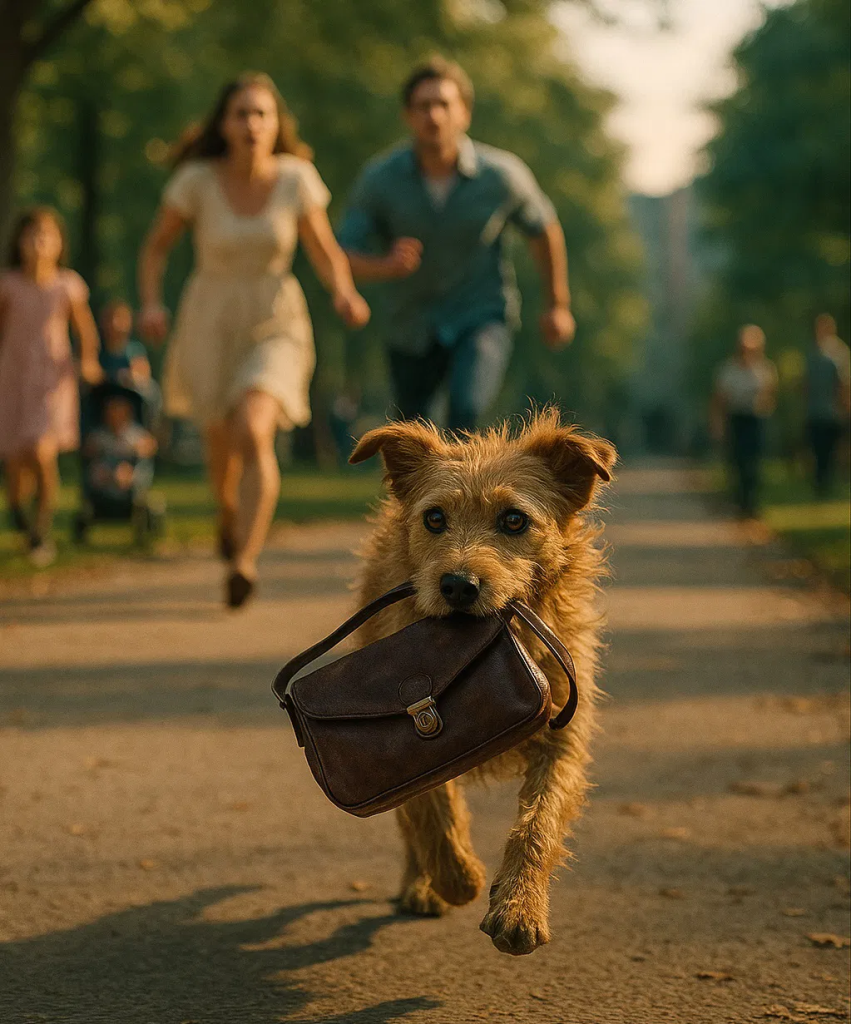The afternoon felt perfect: warm sunlight spilling through the sycamores in Maplewood Park, kids laughing on the playground, and the quiet clink of cups at a nearby café. Daniel and I sat on an old wooden bench, leaning into the kind of easy conversation that needed no interruptions—movies, coffee shops, even a playful debate about the best doughnut in town.

Then a dog appeared out of nowhere.
Smaller than I expected, his coat a tangle of twigs and dust, ribs showing beneath the grime. But his eyes… bright, urgent, almost pleading, like he’d seen too much yet still hoped. He barked softly, stepped closer, then sat, watching us as if waiting for an answer.
At first, I assumed he was just another stray. I patted my lap and gestured for Daniel to shoo him away. But the dog moved closer, pressed his paws on my knees, then darted around us, barking sharply and insistently.
Before either of us could react, he grabbed my purse in his mouth and bolted.
“Hey!” I shouted, voice cracking. Daniel was already on his feet, sprinting after him. The dog didn’t run blindly—he kept glancing back, urging us to follow.
We chased him along winding paths, the park’s laughter fading behind us, tall oaks arching overhead until the path narrowed into an alley between two old brick buildings. Damp stones and a faint metallic tang hinted at a recent rain. The dog dropped my purse onto the ground and sat, panting, like he’d delivered an offering.
I stepped forward, relief and embarrassment knotting in my chest. Then a movement in the shadows caught my eye. A low, stifled groan broke the silence.
“Did you hear that?” Daniel whispered.
Under a threadbare blanket, an older man lay curled against the wall. Torn clothes, streaked with grime. He tried to sit up, hands trembling. For a moment, his eyes met mine—tired, wary, but dignified.
“Please… help,” he whispered.
I dropped to my knees. The man’s breathing was shallow, his skin cool. The dog nudged his shoulder gently, as if saying, I brought them.
Daniel’s phone was out. “I’m calling an ambulance,” he said, calm and decisive.
The man’s lips moved around a name I couldn’t catch, trailing off into a ragged breath. Then, from the far end of the alley, came footsteps—heavy, deliberate. The dog’s ears perked. He planted himself between us and the approaching figures, low warning barks vibrating in his chest.
Two men emerged, moving with practiced precision. When they saw the man on the ground, their faces hardened.
“There he is,” one said, as if marking a target.
The man clutched my sleeve. “Don’t let them take me back,” he hissed.
Everything froze for a heartbeat: the men, the dog bristling, the three of us in the narrow alley. Daniel stepped forward, phone ready. “I’m calling the police,” he said simply, choosing a side.
The dog’s barks escalated, fearless. The men exchanged a quick look, weighing the risk. Sirens echoed in the distance, growing closer. Deciding it wasn’t worth it, they vanished into the deeper darkness of the alleyways.
By the time officers and paramedics arrived, neighbors had gathered: a young woman with a stroller, a man from the corner store, a mail carrier who had noticed something was wrong. Paramedics moved with practiced care while the first officer squinted at the older man.
“That’s Thomas Harris,” he said. “We’ve been looking for him. He reported something important last month… then vanished.”
Mr. Harris explained in fragments: threats on his phone, someone shadowing him, a growing fear that had driven him into hiding. Hospitals and headlines weren’t what he wanted—he only sought peace until circumstance proved otherwise.
The dog, our unlikely guide, lay with his head on Mr. Harris’s knee, calm and watchful.
Paramedics bundled him into blankets and onto a stretcher. The crowd exchanged quiet nods—acknowledgments that say, we saw, we acted.
On the walk home, we named the dog Milo. He trotted confidently beside us, as if he had always known the way to our apartment. He settled quickly into our life, learning routines, pausing at alleys as though listening for hidden stories.
In the days that followed, Mr. Harris recovered, testified when necessary, and slowly reclaimed a measure of safety. But the most important change was simple: he had been found.
Milo stayed with us. Brave, alert, insistent in the smallest ways. People stopped to admire him, patting his head, calling him a hero. I told them the truth: he had stolen my purse, yes—but only to lead us to something far more important than money.
That afternoon taught me one thing: attention costs so little, yet can save everything. The homeless are not invisible. A stray dog is not just a nuisance. Danger lurks at the edges, but sometimes the universe sends a small messenger—a mangy dog with bright eyes—to jolt us awake.
Now, when Daniel and I sit on the park bench beneath the sycamore, Milo at our feet, I slow my steps a little. Kids dash through the grass, coffee warms hands, alleys still hide secrets. But I know: a life can turn on a single bark, a single insistence. And noticing—that small act—can change everything.